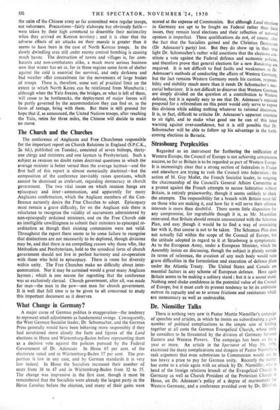What Change in Germany?
A major curse of German politics is exaggeration—the tendency to represent small adjustments as fundamental swings. Consequently, the West German Socialist leader, Dr. Schumacher, and the German Press generally would have been behaving more responsibly if they had scrutinised more closely the facts and figures of the Land elections in Hesse and Wiirtemburg-Baden before representing them as a decisive vote against the policies pursued by the Federal Government of Dr. Adenauer. In Hesse 65 per cent, of the electorate voted and in Wiirtemburg-Baden 57 per cent. The pro- portion is low in any case, and by German standards it is very low indeed. In Hesse the Socialists increased their number of seats from 38 to 47 and in Wiirtemburg-Baden from 32 to 35. The change was impressive in the first Case, though it must be remembered that the Socialists were already the largest party in the Hesse Landrak before the election, and many of their gains were scored at the expense of Communists. But although Land elections in Germany are apt to be fought on Federal rather than local issues, they remain local elections and their reflection of national opinion is imperfect. These qualifications do not, of course, alter the fact that the Socialists gained and the Christian Democrats (Dr Adenauer's party) lost. But they do show up in their true light Dr. Schumacher's rather wild assertions that the elections con- stitute a vote against the Federal defence and ecdnomic policies, and therefore prove that general elections for a new Bundestag are required. It is not difficult to find faults and weaknesses in Dr. Adenauer's methods of conducting the affairs of Western Germany, but the fact remains Western Germany needs his caution, respousi. bility and stability much more than it needs Dr Schumacher's mer- curial behaviour. It is not difficult to discover that Western Germans are deeply divided on the question of a contribution to Western defence, but it is equally easy to see that Dr. Adenauer's repeated proposal for a referendum on this point would only serve to expose this division while adding nothing whatever to rational discussion. It is, in fact, difficult to criticise Dr. Adenauer's apparent intention to sit tight, and to make what good use he can of this latest warning against over-confidence, but it is still possible that Dr. Schumacher will be able to follow up his advantage in the forth- coming elections in Bavaria.














































































 Previous page
Previous page